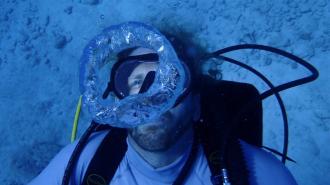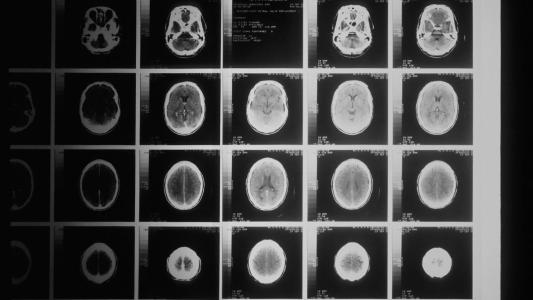Biomedical engineer Joseph Dituri is attempting to break a world record by living in an underwater habitat for 100 days — and he thinks the experience might make him super-human.
The man: After 28 years in the US Navy, Dituri retired as a saturation diving officer in 2012 and went to get his PhD in biomedical engineering from the University of South Florida (USF).
During his studies, he researched hyperbaric medicine and hyperbaric oxygen therapy (HBOT), a treatment that involves inhaling pure oxygen while in a pressurized environment. In addition to teaching at USF, he’s now the chief researcher at a clinic specializing in HBOT.
“My null hypothesis is that there will be improvements to my health due to the increased pressure.”
Joseph Dituri
The therapy: The design of HBOT allows the lungs to collect more oxygen than normal — under certain circumstances, this can boost the body’s ability to heal, making HBTO a useful treatment for a variety of health problems, including severe burns, skin infections, and radiation injuries.
Some studies have also found that HBOT increases the length of telomeres — bits of DNA linked to cell division — and the production of stem cells. Some researchers think this might help combat the effects of aging.
The mission: During HBOT, patients are exposed to pressures 1.5 to 3 times higher than normal for anywhere from 3 minutes to 2 hours. Depending on the condition being treated, they might undergo as few as 3 sessions or more than 40.
On March 1, Dituri swam 30 feet below sea level to enter Jules’ Undersea Lodge, an underwater research lab in Key Largo that he plans to call home until June 9. Because the air pressure in it is 1.6 times higher than on Earth’s surface, he’ll essentially be living in a hyperbaric chamber for 100 days straight.
The goal: While he won’t be inhaling pure oxygen the entire time he’s underwater, and he can leave the underwater habitat occasionally to go for swims, Dituri is still hopeful that his near-constant exposure to increased air pressure is going to reveal new insights into the potential of hyperbaric medicine.
To that end, he underwent a battery of psychosocial, psychological, and medical tests prior to starting the mission and will be regularly visited by medical personnel during it.
“The human body has never been underwater that long, so I will be monitored closely,” said Dituri. “This study will examine every way this journey impacts my body, but my null hypothesis is that there will be improvements to my health due to the increased pressure.”
“So, we suspect I am going to come out super-human!” he added.
Mind matters: In addition to his medical team, Dituri will also receive visits from marine scientists, conservationists, and kids on field trips during his 100-day mission, which he’s dubbed Project Neptune 100.
Still, much of his time in the 160-square-foot lodge will be spent alone, which he thinks makes his mission a useful analog for studying the impact of long-duration space travel on astronauts’ psyches — he’ll be meeting virtually with a psychologist at least weekly during his stay.
“You’re going to put people in a tin can and let them stay for 200 days while they transit from here to get to Mars,” Dituri told Keys Weekly. “Six months. … You have to figure out how to live in a tin can. Why don’t we try living in this tin can underwater first?”
Looking ahead: If Dituri makes it to June 9, he’ll shatter the existing record for living in an underwater habitat: 73 days, which was set by two professors in Jules’ Undersea Lodge in 2014.
While he is excited to see what information he can glean from Project Neptune 100, he knows that much more research will be needed to reach any definitive conclusions about aging, isolation, or hyperbaric medicine.
“I caution people — this is one person doing this, so it’s not the nail in the coffin,” Dituri told Inside Hook. “It is not a Level 2 peer-reviewed paper. It’s the start. And that’s how science gets started: We figure out what the null hypothesis is. And then we do research on it.”
We’d love to hear from you! If you have a comment about this article or if you have a tip for a future Freethink story, please email us at [email protected].






